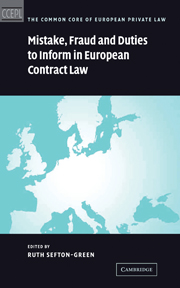Book contents
- Frontmatter
- Contents
- General editors' preface
- Preface
- List of contributors
- Table of legislation
- Table of cases
- List of abbreviations
- 1 General introduction
- 2 Mistake, misrepresentation and precontractual duties to inform: the civil law tradition
- 3 The rise and fall of mistake in the English law of contract
- 4 Case studies
- 5 Comparative conclusions
- Index
3 - The rise and fall of mistake in the English law of contract
Published online by Cambridge University Press: 06 August 2009
- Frontmatter
- Contents
- General editors' preface
- Preface
- List of contributors
- Table of legislation
- Table of cases
- List of abbreviations
- 1 General introduction
- 2 Mistake, misrepresentation and precontractual duties to inform: the civil law tradition
- 3 The rise and fall of mistake in the English law of contract
- 4 Case studies
- 5 Comparative conclusions
- Index
Summary
For the comparative lawyer the doctrine of mistake in the English law of contract is a topic of particular interest – and especially for the comparative lawyer with an eye to the historical development of the doctrine and the continental influences on it. No doubt the story is not yet over. But in the light of the most recent decisions on mistake in the Court of Appeal and the House of Lords we can now trace the development of the doctrine of mistake in three centuries, as it passed through the hands of some key members of the judiciary. For the purposes of this discussion, the first life of mistake is in the nineteenth century, born of the common law but with civil law influences through, notably, the insight of Lord Blackburn. The second life is the twentieth century, first growing into a doctrine of mistake at common law with the assistance of Lord Atkin and then in the second half of the century further developing into a doctrine of mistake in equity under the watchful tutelage of Lord Denning. The third life is just beginning, in the twenty-first century. The growth in mistake which was promoted by Lord Denning is being cut back. Mistake is not dead, but its place in the law of contract is being reassessed.
- Type
- Chapter
- Information
- Publisher: Cambridge University PressPrint publication year: 2005
- 2
- Cited by

